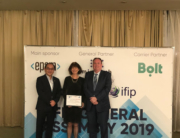
The annual conference of IFIP WG 8.5 on e-Government, e-Democracy, and e-Participation, known as EGOV-CeDEM-ePART 2023, took place this month in the captivating city of Budapest, Hungary. From 5-7 September, participants gathered at Corvinus University to delve into the fascinating realms of e-Government, Digital Government, Open Government, Smart Government, GovTech, eParticipation, e-Democracy, and their interconnected themes.
The conference week commenced with a stimulating PhD Colloquium, providing aspiring scholars with a unique platform to present and discuss their research in the fields of e-Government, e-Democracy and e-Participation, setting the tone for the insightful discussions that followed throughout the event.
Day one of EGOV 2023 kicked off with an inspiring opening session led by Dr Ida Lindgren and Dr Csaba Csaki. The highlight of the day was the keynote address by Professor Yogesh K Dwivedi, who explored the concept of the Metaverse for Government and its associated challenges, opportunities and future research agenda. Professor Dwivedi’s talk ignited discussions on the potential applications of emerging technologies in government services.
Day two of the conference maintained its momentum with another compelling keynote presentation, this time by Andras Koltay, the President of the National Media and Infocommunications Authority and the Media Council. His talk delved into the crucial issue of protecting freedom of expression in the context of social media platforms. Koltay highlighted the challenges in defining the boundaries of what should and should not be published and stressed the need for more context-aware artificial intelligence solutions.
The third keynote speaker, Dr Laszlo Trautmann, head of the Department of Microeconomics at the Corvinus University, explored the ethics of expertise and the political economy implications of AI. His thought-provoking address delved into the evolving role of experts in decision-making processes and the ethical considerations surrounding the use of AI in governance.
In addition to the keynotes, the conference had 23 papers sessions along eight tracks, as well as networking opportunities including the poster session and a welcoming reception in the Municipality of Budapest Capital District I (Castle District).
One cannot overlook the exceptional organisation by Corvinus University of Budapest, led by Dr Csaki and his team, as well as the contributions by IFIP and the Digital Government Society. Their combined efforts ensured that EGOV 2023 was a resounding success, fostering collaboration and innovation in the field of digital governance.
As EGOV 2023 came to a close, it was announced that the EGOV-CeDEM-ePART 2024 will take place in Belgium, hosted by Ghent University and KU Leuven. Cheers to a successful conference, and here’s to the future of digital government!







